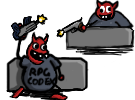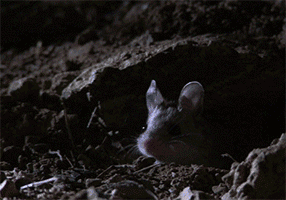You know, I'm not really sure if one even should expect a fully realised survival element from System Shock. System Shock
does predate Resident Evil 1, and honestly, it seems clear that they weren't going for that sort of scarcity. I don't think that's even a bad thing - during my own replay, I
was at first surprised by how liberally the game was showering me with ammunition, but ultimately I noticed that it didn't really bother me; finding new weapons and equipment was still exciting, and even if the combat is quite easy, it still rewards being careful and meticulous instead of just running in guns blazing. So the combat in System Shock works pretty well in context even though it's
literally this:

Mostly, the combat is there to cause enough attrition that finishing a deck in one go can be a tricky proposition. That this attrition is impermanent is clearly the intent - the whole game is designed around the notion that, if nothing else works, you can always slink back to the Medical Deck to patch up and try again. Which is probably a large part of why the game feels so much like an RPG, even though it lacks an experience system, which is apparently all that it takes to be an RPG these days. Still, almost all conventional RPGs, including games like Dark Souls, are "easy" in the sense that you ultimately have unlimited resources at your disposal - you can go back to a bonfire or a town or something, rest up and give the dungeon another go, which basically means that eventually you'll win just by attrition. Even so, they're engaging because of two things: first of all, the game mechanics and level design have sufficient complexity that skill and strategy make a big difference in how efficiently and elegantly you get through obstacles, and secondly, because the effort you put into the game yields progress and persistent rewards.
And really, the original System Shock has a superb sense of progress, with the way you're opening up shortcuts, finding new elevators, clearing out the decks, destroying all of the security cameras, finding all the secret areas and turning off the occasional enemy-spawning plant. This sensation that you're actually taking the station back from SHODAN bit by bit is made really tangible by all this. This is sense of progress is something that SS2, for all of its high difficulty and RPG mechanics, has much less of - you spend much of the game on a leash and the exploration you do get to do isn't that exciting because the scarcity and degradation mechanics have you clobbering most your enemies with the almighty wrench anyway. This is why SS2 feels like running menial fetch quests in a world that exists to arbitrarily obstruct you, while SS1 feels like fighting a guerrilla war in the belly of a horrible machine that is bleeding to death, largely thanks to your heroic efforts.










![The Year of Incline [2014] Codex 2014](/forums/smiles/campaign_tags/campaign_incline2014.png)


























